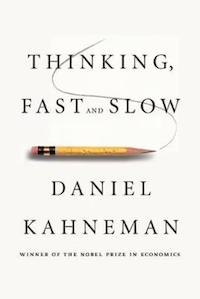Public ideas
Vale Daniel Kahneman – a thinker who brought economics back to earth
Daniel Kahneman, one of a handful of non-economists to win the Nobel Memorial Prize in Economic Sciences, died last week.
He and his colleague Amos Tversky were graduates in psychology at the Hebrew University of Jerusalem, and both served as psychologists in the Israel defence forces.
Their interest as psychologists was about how people make use of available information to make decisions. This work was to give rise to the discipline known as behavioural economics, now well-known and recognized by policymakers.
Their work brought into economics an empiricism that had been absent in most mainstream thinking. That mainstream, exemplified by Milton Friedman and others of the Austrian School, was based on the idea that people make rational decisions when faced with economic choices. They may not do so individually, but collectively people tend to act in line with rational self-interest. Kahneman and Tversky demonstrated that contrary to this model, people have certain consistent biases that lead them away from rational decision-making – misunderstanding of probability, disregard for delayed consequences and so on.
On his website John Quiggin has an obituary to Kahneman, explaining the slow path his and Tversky’s ideas took towards acceptance by the economics profession. Although their work was published in the 1970s, it wasn’t until the late 1980s that it made its way into the mainstream. (Had Amos Tversky not died in 1996 he would surely have been acknowledged as a joint prize winner with Kahneman.)
That slow path to acceptance is partly about the tortuous way knowledge spreads. So intense is the pressure on academics to publish, that rigorous, ground-breaking research, including the work of Kahneman and Tversky, becomes buried in a mass of low-quality journal articles. And such is the compartmentalization of disciplines that academics rarely venture into the journals and conferences of other disciplines: the original work of Kahneman and Tversky was published in psychology journals, not in economics journals.

Even once behavioural economics became better known, it still faced resistance from the economics profession, because it upset the neat, integrated models of economics, based on deductive logic. As an analogy we can imagine engineers living in an imaginary world in which they ignore the harsh reality of friction. We have functioning power systems, safe air travel and reliable bridges because engineering is based on deductive and empirical paths to knowledge, while much of economics, including neoliberalism, is based on ideas insulated from empiricism.
Much has been written on behavioural economics. One work that has had widespread circulation, and has influenced policymakers, is Kahneman’s 500-page book Thinking fast and slow, published in 2011. Our ingrained ways of decision-making, relying on simple heuristics and economising by not spending too much time making decisions, serve us well most of the time, but can often let us down in situations where our choices have significant consequences.
Joe Walker, in a tribute to Kahneman, has brought to our attention his 2003 paper Maps of bounded rationality: psychology for behavioural economics, published in the American Economic Review. In 22 easily-read pages it covers most of the basic ideas of behavioural economics.
Raising bullies
Think back to the bullies you encountered in your schooldays. How many have re-appeared in later life as “successful” corporate executives, politicians, or multi-millionaires? And as a corollary how many have inflicted costly damage on the organizations where they have exercised their power?
Writing in The Guardian George Monbiot reflects on the way we bring up children, unintentionally rewarding bullying behaviour: From the playground to politics, it’s the bullies who rule. But it doesn’t have to be this way. Monbiot writes about the ways children are forced into destructive competition, for example in games that allow only for win-lose outcomes, both in their contests and in competition for positions in teams’ hierarchies. Football is an excellent mechanism to reward the aggressive and inconsiderate, while ensuring that others learn to be deferential to and fearful of strongman authority.
In adult life bullies learn to abide by rules that prohibit physical aggression, and they learn how to mask their aggression, but they develop other ways to bully.
In fact bullies may not have to hide their aggressive behaviour. Monbiot points out that “Trump, Putin, Netanyahu, Orbán, Milei and others do little to disguise their crude dominance behaviours”, because these people are attractive to those who seek a strong “leader”.
It doesn’t have to be like this he argues, because collectively we have some control over the ways we bring up children and over the rules that govern the way we live with one another. But as manifest in the economic assumptions of neoliberalism, we have chosen rules that present our relationships as zero-sum games: if I win you must lose. Such rules are dysfunctional, for as evolutionary biologists know, groups with norms of cooperation do better than those with norms of selfishness.